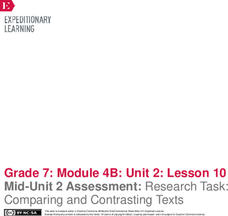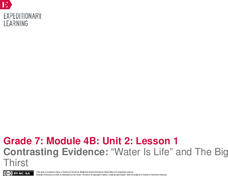EngageNY
Mid-Unit 2 Assessment: Research Task: Comparing and Contrasting Texts
It's the half-way mark! Pupils demonstrate understanding of unit standards by completing a mid-unit assessment. After reading an informational article about water management strategies, scholars complete a graphic organizer to identify...
EngageNY
Gathering Information about Water Management: Assessing and Reading Internet Sources, Day 3
Water is life! Using the informative resource, scholars first read two informational articles about water management in agriculture. Then, they use a Venn diagram to contrast the different types of evidence authors use to support a...
EngageNY
Gathering Information about Water Management: Assessing and Reading Internet Sources, Day 2
Accuracy, credibility, timeliness ... it's time to act on source reliability! Pupils continue conducting Internet research, selecting two questions about water management from their researcher's notebooks that they want to explore...
EngageNY
Using Effective Search Terms: Researching Water Management
Discover how to use search terms effectively! Scholars continue their exploration of Charles Fishman's The Big Thirst, engaging in a read aloud and then answering text-based questions. Next, pupils learn about using search terms and...
EngageNY
Contrasting Authors’ Use of Evidence: Bottled Water
Apples to oranges, Dasani to Aquafina. Using a Venn diagram, scholars contrast two authors' use of evidence on the topic of bottled water. Additionally, they continue reading Charles Fishman's The Big Thirst and answering text-dependent...
EngageNY
Finding Relevant Information and Asking Research Questions: The Big Thirst
Let's get to the gist. As scholars continue their study of Charles Fishman's The Big Thirst, they practice writing the gist of the text. Additionally, pupils add notes about the industrial uses of water to their researcher's notebooks.
EngageNY
Analyzing Interaction: Categories of Water Management in The Big Thirst
It's puzzle time! Pupils participate in a jigsaw activity to discuss the various uses of water, including personal, agricultural, and industrial uses. They also conduct a close reading of The Big Thirst by Charles Fishman and answer...
C-SPAN
Choice Board: Expressed and Implied Powers
Article 1, Section 8 of the United States Constitution expressly lists powers given to Congress. Over the years, lawmakers have expanded the enumerated powers to include powers implied by the list. To better understand the significance...
Arcademics
Hungry Puppies
It all comes down to the treats. Individuals compete to find decimals' addends to arrive at a given sum. Pupils click on two dog treats with values that add to the target number. Each round contains the same sum and lasts a minute, and...
Arcademics
Pizza Pandas
Grab a fraction of the pizza pie. Players match the written fraction to the amount of pizza shown on the platter. The game allows for up to four individuals at the same time. Scholars reach for a napkin with the fraction that matches the...
Arcademics
Ratio Blaster
Shoot the equivalence before it gets you. Individuals practice determining equivalent ratios in six levels in an online interactive. Scholars shoot down the invaders before they reach the planet by identifying an equivalent ratio to the...
Arcademics
Ratio Martian
Identify the correct ratios for food. Pupils play a six-level online game to practice identifying ratios. Learners see ratios in several forms mixed in with non-ratio quantities. Individuals click on each ratio to feed the hungry martian...
EngageNY
Gathering Information about Water Management: Assessing and Reading Internet Sources, Day 1
It takes time to discover what makes a source accurate and credible. Using everything they've learned about source credibility, scholars begin researching supporting questions about how industry and agriculture manage water. They select...
EngageNY
Contrasting Evidence: “Water Is Life” and The Big Thirst
Sometimes differing arguments support the same claim. Scholars complete a graphic organizer comparing how two authors support the claim that people need to better manage the world's water supply. Pupils also complete a graphic organizer...
EngageNY
Final Performance Task: Sharing Visual Representations of Position Papers
Take note! Scholars use sticky notes to record information as they gallery walk to look at classmates' visual representations they created for their end of unit assessment. Learners then choose one word that represents the work they...
EngageNY
Mid-Unit Assessment, Part II: Research Task: Comparing and Contrasting Texts
When it comes to comparing texts, it's apples to oranges. As part two of the mid-unit assessment, learners compare and contrast two texts about the Internet and brain health. While reading, scholars use a Venn diagram to compare two...
American Museum of Natural History
Cosmic Connection
Do you see what I see? Individuals view eight images from the Hubble Space Telescope and then determine exactly what is being shown in the images. The pictures range from the rings of Saturn to views of billions of galaxies that take up...
American Museum of Natural History
What Do You Know About Stars?
Illuminate the information about stars. Pupils respond to 10 multiple choice questions about stars. The questions cover topics such as the size of the Milky Way Galaxy, the Sun, and the life cycle of a star. The resource works as a...
Just Health Action
What Makes a Community Healthy?
Young people have an opportunity to make it a beautiful day in their neighborhoods with an activity that asks them to identify what is healthy and unhealthy in their community and develop some ideas about what they can do to fix the...
American Museum of Natural History
What Do You Know About T. Rex?
There's so much to learn about dinosaurs. A 10-question quiz tests knowledge of the more detailed characteristics of the Tyrannosaurus Rex. As individuals complete the quiz, they better understand how fossil records helped define some of...
American Museum of Natural History
Field Trip Mars
Fly around the Martian surface. Pupils view a presentation on the planet Mars featuring a flyover that shows different views of the surface where rovers have landed and explored on different missions. As individuals watch the images, the...
American Museum of Natural History
Layer of Time
Dig through the layers for a better understanding of fossils. Scholars learn that fossils form in layers of sedimentary rock. Pupils arrange virtual layers to show the fossil record of different species. Once the layers are correct, they...
American Museum of Natural History
Identification Adventure
Put all the pieces together. After a skeleton is put together, pupils play the scientist to determine the type of animal they have by using a classification tree to narrow down the identity. After each decision, they gain advice from an...
American Museum of Natural History
What Do You Know About Astronomy
Develop an understanding of the universe. Learners answer 10 multiple choice questions about several topics in astronomy. Questions contain information about the age of the universe, gravitational attraction, galaxies, planets and comets...

























